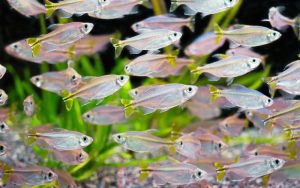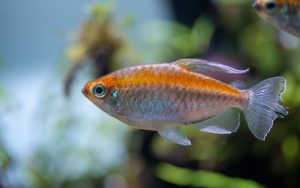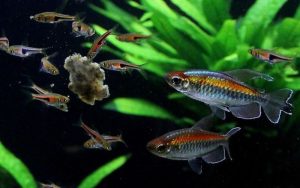If you’re a guppy owner, you may have noticed your fish’s poop hanging from its body. Don’t worry, this is a common issue among many freshwater fish owners, and there are several reasons why it can happen.
Various factors, including constipation, overfeeding, and poor water quality, can cause guppy poop hanging. It is unsightly and can also be a sign of potential health problems for your guppies.
In this post, we’ll explore why guppy poop stuck and what you can do to prevent it from happening.
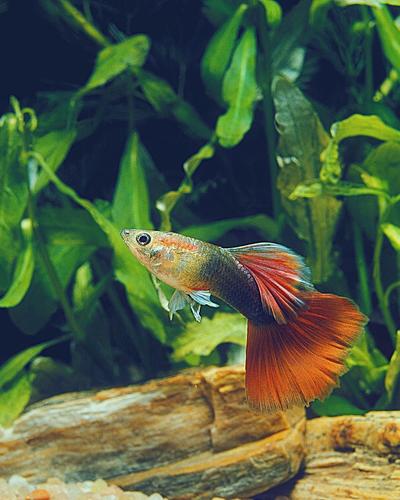
We’ll also provide the best solutions to help your guppies pass their poop more easily and stay healthy. So, if you’re tired of seeing guppy poop hanging from your fish, keep reading to learn more!
Table of Contents
ToggleDo Guppies Poop a Lot?
As with any living creature, guppies do produce waste, including feces. However, the amount of waste produced by guppies is relatively small and manageable in a properly maintained aquarium. The regularity of their bowel movements can vary depending on their diet and other factors, but it is not excessive.
What Does Guppy Poop Look Like?
What does normal guppy poop look like? Guppy poop can appear depending on the fish’s diet and other factors.
Generally, guppy poop is small, cylindrical in shape, and brown in color. The size of the poop can also vary depending on the size of the guppy. However, if there are underlying health issues or poor water quality, the appearance of the poop can change.
For example, if a guppy is constipated, the poop may be longer and thicker than usual or white and stringy. If the guppy has a parasite or bacterial infection, the poop may be discolored and have an abnormal texture.
It’s hard not to notice guppy long poop since it often trails behind the fish in the water. However, overfeeding can lead to constipation, which causes the fish to become bloated and fat. In such cases, the poop may be thicker and longer than usual, making it more noticeable.
It is important to monitor your guppy’s poop regularly, as changes in appearance can indicate potential health problems. If you notice any abnormal changes in your guppy’s poop, taking appropriate steps to treat the fish and maintaining a healthy environment in the aquarium may be necessary.
What is White Stringy Poop?
White stringy poop, known as white feces, is a concerning issue observed in guppy fish. This condition manifests as elongated, thread-like excreta that can be either entirely white or accompanied by a clear, slimy substance. The presence of such abnormal feces is usually indicative of an underlying health problem in your guppies.
Why Does My Guppy Have White Stringy Poop?
Guppy fish produces white poop primarily due to inappropriate eating habits. Mucus is a slimy substance that helps with lubrication but often goes unnoticed as it gets covered with the fish’s waste.
If you notice A guppy with stringy white poop, it could be a sign of a parasite or worm infestation. The stringy appearance of the poop is a result of the parasites or intestinal worms attacking the digestive system of the guppy.
These parasites or worms can be introduced to the fish tank through contaminated water or new fish. White poop, along with other symptoms like loss of appetite or weight, can indicate the presence of a serious health issue in your guppy.
Therefore, it is essential to take immediate action and consult a veterinarian. They can recommend the appropriate treatment, including medication such as seachem cupramine or changes in the water and feeding habits. Regular tank maintenance and quarantine of new fish can also help prevent such diseases in your guppy.
Possible Causes of White Stringy Poop in Guppies
Internal Parasites
One of the primary culprits behind white stringy poop in guppy fish is the presence of internal parasites. These microscopic organisms can wreak havoc on your guppies’ digestive system, leading to malabsorption of nutrients and abnormal bowel movements. Common parasites responsible for this condition include nematodes, tapeworms, and flagellates.
Poor Water Quality
Maintaining a clean aquatic environment is crucial for the well-being of your guppies. Poor water quality, caused by inadequate filtration, high ammonia levels, or irregular water changes, can stress the fish and compromise their immune system, making them more susceptible to infections that result in white stringy poop.
Bacterial Infections
Bacterial infections can also contribute to the appearance of white stringy poop. Pathogenic bacteria like Aeromonas and Pseudomonas can attack the gastrointestinal tract, leading to inflammation and abnormal stool production in guppy fish.
Improper Diet
A balanced and nutritious diet plan is essential for guppies to thrive. Feeding them low-quality or inappropriate food can lead to digestive issues, causing white stringy poop as a symptom.
Recognizing the Symptoms
Apart from the characteristic white stringy appearance of the feces, guppies affected by this condition may exhibit other signs of distress. Keep an eye out for the following symptoms:
- Lethargy: Infected guppies may appear sluggish and spend more time at the bottom of the tank.
- Loss of Appetite: A decrease in food intake is a common indicator of health problems in guppies.
- Faded Coloration: Sick guppies might lose their vibrant colors and appear pale or faded.
- Frayed Fins: The fins of infected guppies may appear frayed or ragged.
How to Treat Guppies with White Poop?
White poop in guppies can be caused by various factors, including parasites, overfeeding, constipation, and poor water quality. Here are some steps you can take to treat guppies with white poop:
- Identify the root cause of the white poop issue. Observe your guppies’ behavior and look for other red flags such as lethargy, loss of appetite, and stringy white poop.
- Perform a thorough aquarium cleaning and maintain appropriate water temperature. Check the ammonia and nitrite levels and perform water changes to keep the water clean and healthy for your guppies.
- Adjust your guppies’ diet and feeding schedule. Feed the fish a balanced diet of pellets and flakes, and avoid overfeeding. You can also try feeding them a boiled pea to help with constipation.
- Consider adding Epsom salt to the aquarium. This can help treat internal parasites and relieve intestinal blockages and constipation in guppies. Follow the appropriate dosage instructions and monitor your guppies’ behavior.
- If the issue persists, consider using appropriate medication to treat the fish. Consult a veterinarian or aquatic specialist to determine the appropriate treatment for your guppies.
In summary, to treat guppies with white poop, it is important to maintain a balanced diet and appropriate water parameters, identify the root cause of the poop issue, and take appropriate steps to treat the fish and keep them healthy.
Guppy Fish Treatment and Prevention
Quarantine
If you suspect one or more guppies in your tank have white stringy poop, promptly isolate them in a quarantine tank. This measure helps stop the spread of the condition to other fish species in the main tank.
Medication
Consulting with a veterinarian experienced in aquatic medicine is essential for accurate identification and appropriate treatment. They may recommend specific medications to target the underlying cause, such as antiparasitic drugs or antibiotics.
Improve Water Quality
Regularly test and maintain the tank water parameters. Invest in a reliable filter and perform routine water changes to check ammonia and nitrate levels.
Provide Proper Nutrition
Ensure your guppies receive a well-balanced diet that meets their nutritional requirements. High-quality commercial fish food supplemented with occasional treats like brine shrimp or daphnia can enhance their overall health.
What Causes Constipation In Guppies?
Constipation is one of the most common health issues in guppies. It occurs when there is a blockage in the digestive system, causing the fish difficulty passing waste. This condition is often caused by overfeeding, as guppies have small stomachs and can easily become constipated if given too much food.
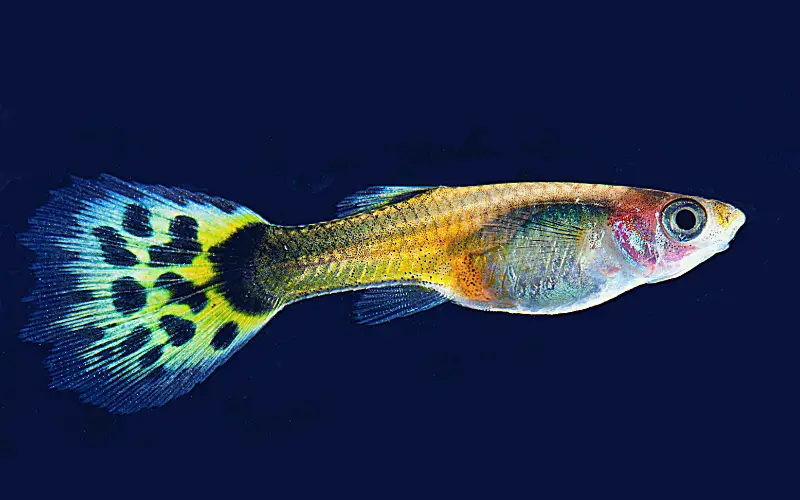
When a guppy is constipated, it may appear lazy and have a distended belly. To prevent constipation in your guppies, it is important to feed them a balanced diet and avoid overfeeding.
Guppies are tropical fish, so their diet should consist of specially formulated guppy food supplemented with small amounts of live or frozen food. Keeping the fish tank clean and maintaining good water quality can also help prevent constipation and keep your guppy healthy.
What Are The Symptoms Of Constipation In Guppies?
Constipated guppies have a swollen abdomen and may appear rounder than usual. They may also have difficulty passing waste, resulting in a lack of bowel movements. Another symptom is lethargy, where constipated guppies are often less active and may rest more.
In some cases, the waste produced by constipated guppies may appear stringy or discolored. To help alleviate constipation in guppies, providing a well-balanced diet that includes fibrous foods such as vegetables is important.
Increasing the intake of live or frozen foods, such as daphnia or brine shrimp, can also help stimulate their digestive system. Keeping the water clean and maintaining proper tank conditions can also prevent constipation in guppies.
How Do You Treat Guppy Constipation?
One effective treatment for guppy constipation is feeding them a small, cooked pea. Peas have a high fiber content that can help move things along in their digestive tract and relieve constipation.
Another option is adding some Epsom salt to the aquarium water. The Epsom salt acts as a natural laxative and can help soften the impacted feces, making it easier for the guppy to pass.
However, it is important to remember not to overfeed the guppies, as overeating can lead to constipation. Guppy owners can prevent constipation and maintain the fish’s health by providing a balanced diet, cleaning the tank regularly, and monitoring their feeding habits.
Do Guppies Poop Before Giving Birth?
Yes, guppies can continue defecating even while in labor and just before giving birth. This is a natural process and is not cause for concern as long as the water quality is properly maintained.
Monitoring water conditions and performing regular tank maintenance is important to keep the aquarium clean and healthy for the guppies and their offspring.
Why Is My Pregnant Guppy Pooping White?
If you notice your pregnant guppy pooping white, it could be a cause for concern. Guppies are typically vibrant and colorful fish, but when they start pooping white, it may indicate an underlying issue.
One possible reason for this is a parasite infestation. Parasites can cause various digestive problems in guppy fish, including white poop. These parasites can disrupt the digestive system’s normal functioning and affect the feces’ color and consistency.
It is significant to address this issue promptly to prevent further complications. Consulting a pet fish veterinarian or an experienced fish keeper can help identify the exact cause of the white poop and provide appropriate treatment.
Regular water quality checks, maintaining a clean and spacious tank, and providing a balanced diet can also contribute to the overall well-being of your pregnant guppy.
Commonly Asked Questions about Guppy Have White Poop (FAQs)
What causes guppy poop hanging?
Various factors, including parasitic infection, digestive issues, or dietary changes, can cause guppy poop hanging.
How can I prevent guppy fish poop hanging?
To prevent guppy poop hanging, it is important to maintain a clean and well-maintained aquarium, provide a balanced diet, and regularly monitor the health of your guppies.
Can guppy fish have white poop?
Yes, guppy fish can have white poop. White poop in guppies can be a sign of digestive issues or a parasitic infection.
Are there any diseases associated with white poop in guppies?
White poop in guppies can be a symptom of various white poop diseases, including parasitic infections, bacterial infections, swim bladder, or digestive disorders.
What should I do if my guppy has white poop?
If your guppy has white poop, monitoring its behavior and observing for any other symptoms is advisable. If the issue persists or worsens, consult a veterinarian for proper diagnosis and treatment.
Can guppy poop indicate the health of the fish?
Yes, the appearance of guppy poop can provide valuable insights into the health of the fish. Abnormalities in color, consistency, or frequency of poop can be indicative of underlying health issues.
How can I treat guppy poop hanging?
The treatment for guppy poop hanging depends on the underlying cause. You may need to administer appropriate parasite medication if it is due to a parasitic infection. Consult your nearby veterinarian for a proper diagnosis and treatment plan.
Is it normal for guppy poop to have no food remnants?
A: It is not uncommon for guppy fish poop to have no visible food remnants. Guppies have a fast digestion process, and their waste may not always show food remnants.
Why should I join an aquarium forum for help with guppy poop hanging?
Joining an aquarium forum can be beneficial as you can seek advice and guidance from experienced fish keepers. They can help you identify the cause of guppy poop hanging and suggest appropriate solutions.
Conclusion
White stringy poop in guppy fish is a concerning issue, but it can be effectively addressed and prevented with vigilance and proper care. By understanding the potential causes, recognizing the symptoms, and taking the proper measures, you can ensure the well-being of your guppies and create a thriving aquatic habitat. Remember, a healthy environment and a balanced diet are the pillars of your guppies’ well-being. Happy fish keeping! At infishtank.com, we are dedicated to providing valuable insights and solutions to help you become an informed and successful aquarium hobbyist. For more in-depth articles and expert advice, visit our website and embark on a journey of aquatic knowledge!
You might also like
- 5 Deadly Guppy Diseases You Need to Avoid (Complete Guide)
- Bloated Guppy Fish: 3 Surefire Ways to Save Your Fish!
- Guppy Dropsy or Pregnant: Don’t Miss These Warning Signs!
- Guppy Tail Split: 5 Simple Tricks to Avoid the Heartbreaking
- Swim Bladder Disease Guppy: 58 Seconds to Save Your Fish!
- Constipated Guppy 101: Symptoms, Causes & Best Treatment!
- Pregnant Guppy Not Giving Birth: 3 Causes & Quick Help!


